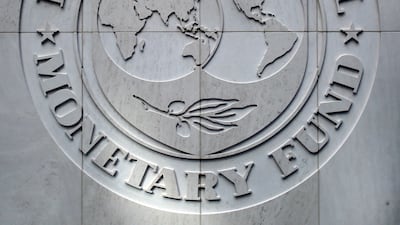Governments must take prudent measures to manage debt and their fiscal policy amid weaker global economic growth and tighter monetary policy to avoid future economic pain, the International Monetary Fund (IMF) said on Monday.
Managing current high levels of debt will become increasingly difficult if the economic outlook continues to deteriorate and borrowing costs rise further, the Washington-based lender warned in a blog post.
"Governments should adopt fiscal strategies that help reduce inflationary pressures now and debt vulnerabilities over the medium term, including by containing expenditure growth — while protecting priority areas, including support to those hardest hit by the cost-of-living crisis," the IMF said.
"This would also facilitate the work of central banks and allow for smaller increases in interest rates than would otherwise be the case. In times of turbulence and turmoil, confidence in long-run stability is a precious asset."
Global debt remained at nearly 19 per cent of GDP above pre-pandemic levels at the end of last year, even after posting the steepest decline in 70 years, posing a challenge for policymakers.
Total public and private debt decreased last year to the equivalent of 247 per cent of global GDP, falling by 10 percentage points from its peak level in 2020, the latest update of the IMF’s Global Debt Database indicated.
However, in dollar terms, global debt continued to rise, although at a much slower rate, reaching a record $235 trillion last year, IMF data showed.
Private debt, which includes non-financial corporate and household obligations, drove the overall reduction, decreasing by 6 percentage points to 153 per cent of GDP, the IMF data showed.
The decline of 4 percentage points in public debt, to 96 per cent of GDP, was the largest such drop in decades, the database indicated.
"The unusually large swings in debt ratios are caused by the economic rebound from Covid-19 and the swift rise in inflation that has followed," the IMF said.
Debt levels varied across economic groupings.
The fall in debt was largest in advanced economies, where both private and public debt fell by 5 per cent of GDP last year, reversing almost one third of the surge recorded in 2020.
In emerging markets (excluding China), the fall in debt ratios last year was equivalent to almost 60 per cent of the 2020 increase, with private debt falling more than public debt.
In low-income developing countries, total debt ratios continued to increase last year, driven by higher private debt.
The IMF attributed the unusually large movements in private and public debt around the world to three main factors.
First, the recession at the onset of the pandemic contributed to a major drop in GDP, which was reflected in the sharp rise in debt-to-GDP ratios in 2020, but as economies recovered from the crisis, the strong rebound in GDP helped the fall in debt ratios last year.
Second, inflation rates fell significantly in the first year of the pandemic, a trend that reversed last year as prices rose sharply in many countries. During 2020 and last year, economic activity and inflation moved together: inflation fell and then rose with output. These factors induced large swings in nominal GDP that contributed to the changes in debt ratios, the IMF said.
Third, the effects of economic shocks on the budgets of governments, companies and households had an impact on debt levels. Debt and deficits increased significantly in 2020 because of the economic recession and the sizeable support extended to individuals and businesses. Last year, fiscal deficits declined but remained above their pre-pandemic levels.
"The weaker growth outlook and tighter monetary policy call for prudence in managing debt and conducting fiscal policy," the IMF concluded.


